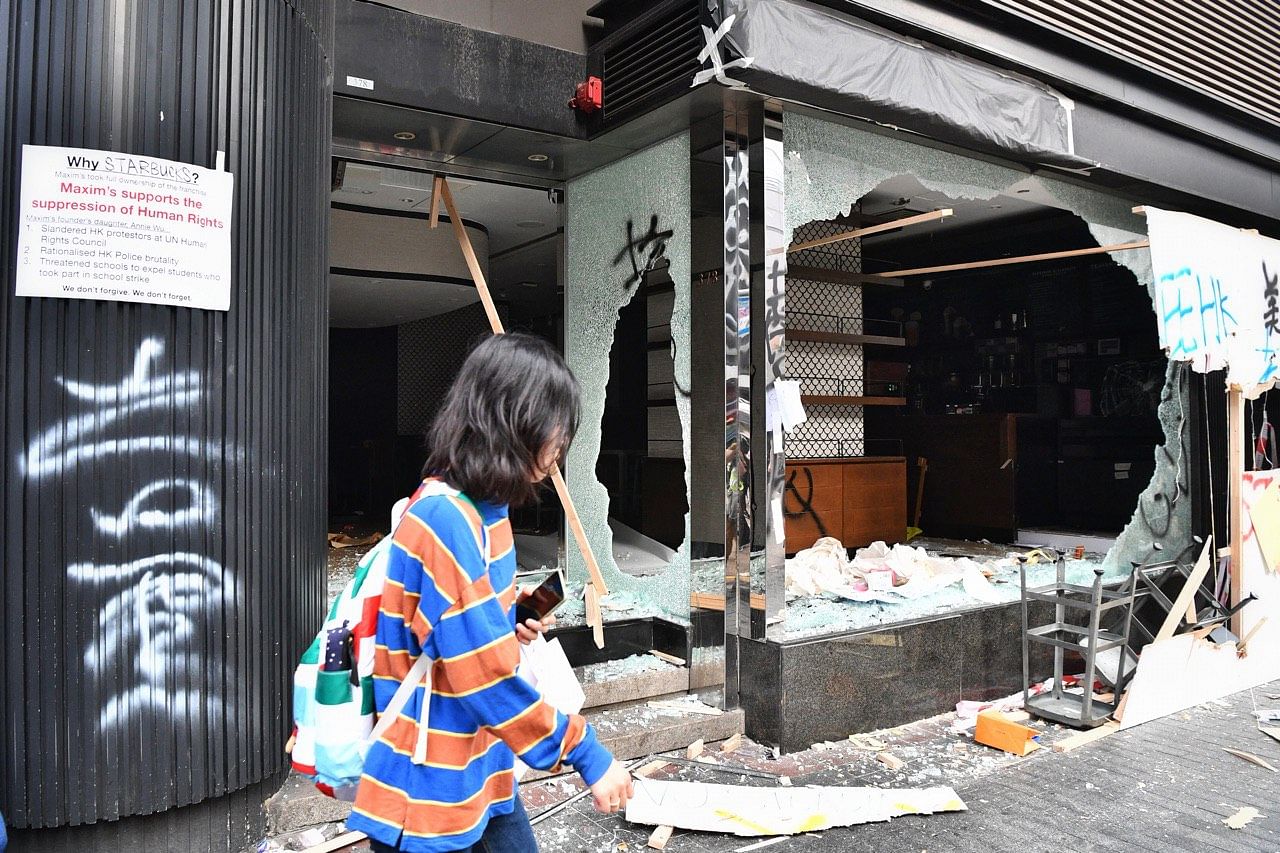Petrol bombs thrown inside Hong Kong metro station, no one injured: Govt
Sign up now: Get insights on Asia's fast-moving developments
HONG KONG (REUTERS) - Petrol bombs were thrown inside a Hong Kong metro station on Saturday (Oct 12) but no one was injured, the government said, as pro-democracy protesters again took to the streets angry at what they believe is Beijing's tightening grip on the city.
The Kowloon Tong station was seriously damaged in the attack, the government said in a statement. Riot police took to the streets of Kowloon after the petrol bomb attack.
Hundreds of protesters, many young and wearing face masks, were marching in Kowloon at the time and were headed to a district near the Kowloon Tong station.
"The protesters are participating in an unauthorised assembly, which constitutes an offence under the Hong Kong Laws. The police appeal to the protesters to stop all illegal acts and leave immediately," police said in a statement.
Hong Kong's protests started in opposition to a now-abandoned extradition bill but have mushroomed in four months into a pro-democracy movement and an outlet for anger at social inequality in the Asian financial hub.
The protests have plunged the city into its worst crisis since Britain handed it back to China in 1997 and is the biggest popular challenge to Chinese President Xi Jinping since he came to power in 2013.
Hong Kong had experienced relative calm since last weekend, when a peaceful march by tens of thousands spiralled into a night of running battles between protesters and police.
Since then there had only been small nightly protests and activists had not flagged any major action this weekend.
A small group calling itself the "Silver-Haired Marchers"began a 48-hour sit-in at police headquarters on Saturday, describing themselves as "old but not obsolete".
"The young people have already sacrificed a lot, it is about time for us, the senior citizens in Hong Kong to come forward to take up part of the responsibility from the young people,"63-year-old Shiu told local media.
"I mean for us, even if we are caught by the police because of an illegal gathering, I don't mind," said Shiu, who was identified with only one name.
Emergency laws were introduced a week ago banning face masks at public rallies, sparking some of the worst violence since the protests started. Protesters use masks to shield their identities.
However, hundreds of people, including school children and office workers, have since defied the ban and wore face masks. A group of protesters plan a "face mask party" on Saturday night.
Hong Kong's police, once praised as "Asia's finest", are also facing a crisis of confidence amid the worsening political tensions. Protesters accuse them of using excessive force, a charge police deny, and two protesters have been shot and wounded during skirmishes with police.
Apple removed an app this week that helped protesters track police movements, saying it was used to target officers.
Several US senators have called for halting and even banning US tear gas exports to Hong Kong.
On Oct 1, when China marked the 70th anniversary of the People's Republic, police said they deployed a record level of force, including 1,400 rounds of tear gas, 900 rubber bullets and six live rounds.
Sales of tear gas to Hong Kong were equivalent to supporting efforts of the Chinese president to "harm ordinary citizens and peaceful protesters", said US Republican Senator Rick Scott in a letter to a US firm exporting tear gas to Hong Kong.
He urged the firm on Thursday to "put human rights above profits".
Hong Kong is facing its first recession in a decade due to the protests, with tourism and retail hardest hit.

A tourist walking past a Starbucks outlet along Nathan Road that has been vandalised by protesters, on Oct 12, 2019.
ST PHOTO: CHONG JUN LIANG
Many shops have been shutting early to avoid becoming a target of protesters and due to closures of the metro rail system after several stations were torched and trashed.
Hong Kong's metro has borne the brunt of protests and only returned to near normal operations on Friday after being completely shut down. The metro, which normally carries around 5 million people a day, will again shut early on Saturday.
Many fear China has been eroding Hong Kong's freedoms, guaranteed under a "one country, two systems" formula introduced with the 1997 handover.
The now-withdrawn extradition bill, under which residents would have been sent to Communist-controlled mainland courts, was seen as the latest move to tighten control.
China denies the accusation and says foreign countries, including Britain and the United States, are fomenting unrest.
US President Donald Trump said in announcing a partial trade deal with China on Friday that he had raised Hong Kong in the talks after previously warning that a deteriorating situation in the city could affect the negotiations.


